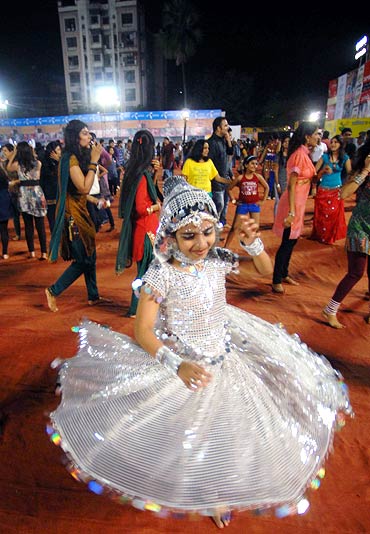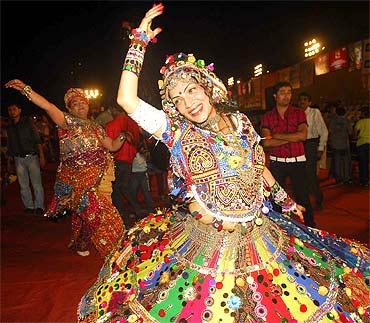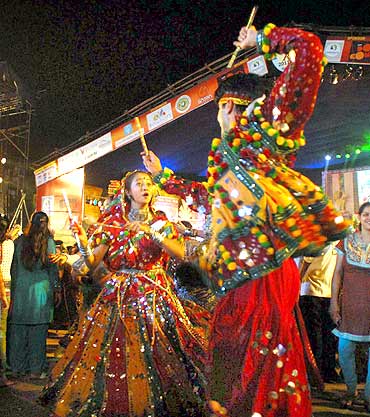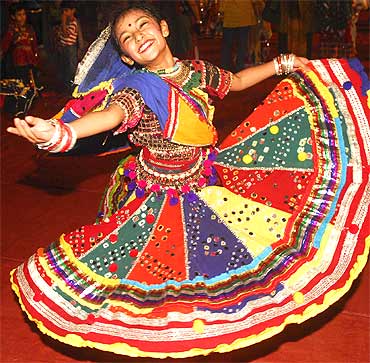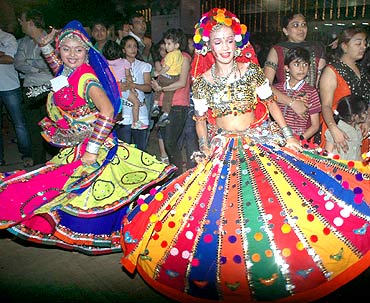 | « Back to article | Print this article |
Kids, here's why your parents are hiring 'Navratri detectives'
For children of many conservative Indian families, Navratri means getting the licence to do what they always wanted to -- partying, smoking, drinking and making out. But with parents increasingly resorting to private detectives to snoop on them, the festival of nine nights isn't always fun and games. Abhishek Mande weighs in the pros and cons.
Kirtesh Kavi holds up an iPhone before me. He scrolls through his contacts, clicks on a particular name and proceeds to demonstrate how a video call is made.
The 3G-enabled handset is an extension of Kavi's personality -- sophisticated, suave and with-it -- and will be his weapon of choice later in the evening.
Kirtesh Kavi runs Cosmopolitan Security and detective services and like all his peers in Mumbai and prominent cities in Gujarat, Kavi is a busy man this Navratri.
Like each year, the 37-year-old sleuth and his team will be shadowing young Navratri revellers at the behest of their parents.
The trend of concerned parents wanting to know what their young wards are up to during the nine-night festival is an old one.
Unlike most Indian festivals, which are a daytime affair, Navratri celebrations begin way after sundown. During simpler times when Mumbai used to Bombay and a far safer place, these celebrations would go late into the night.
The sheer nature of the festival -- hours of dancing to fast music -- also makes it more a festival of the young than of the old.
So while on a regular night a traditional family (Gujarati or otherwise) wouldn't dream of letting their daughter go out clubbing, these nine nights offer the young one an opportunity to taste freedom.
However, over the years as parents have grown smarter and more suspicious they tend to hire the services of detectives such as Kavi and his colleagues.
These detectives trail them night after night and gather photo and video evidence to prove (or disprove) the parents' suspicions.
This year things have gone to a completely different level. Those parents who are too impatient to wait for a report the following morning can, thanks to 3G some innovative investigators such as the man holding up the iPhone before me, watch what their children are up to in real time!
To be able to do this they are even willing to shell out an extra Rs 20-40k and purchase an iPhone or an Android-based smartphone just so they can do it.
(Note: All images are for represenational purposes only)
'There is growing mistrust between parents and children'
Interestingly, spying on teenagers is not just a Navratri phenomenon. The detectives I spoke to tell me it is a yearlong exercise. During Navratri things just get crazier! Bookings are made months in advance and the work pressure is so high that some agencies have to resort to hiring extra help during this time.
So what kind of parents send out spies on to trail their own blood during Navratri or otherwise?
The rich do, obviously. And middle class too, as it turns out. Should you choose to believe a detective, even a vada pav vendor once wanted to find out what his son was up to!
Another sleuth who employs children of policemen also told me that on not-so-stray occasions, he and his team even investigate on behalf of those very officers!
According to psychologist Sadia Raval, one of the primary reasons for this trend is 'the growing mistrust and the drastic increase in communication gap between the two generations where parents are not in sync with what these children want to do'
Raval who specialises in children and teen issues says that the economic development in the last two decades has contributed a lot to the widening of this generation gap.
"The generation gap was always there," she points out, "The problem is that it has widened drastically between the current generation and its parents. Over the last decade a lot of traditional things that we held on to are being questioned. Because of the technological advancements, young people especially are being exposed to global values. And as it always happens, with the onslaught of these values the core traditional ones are weakened."
To put it simply, never before has there been a time in India's social setup when two generations have been brought up on such different set of values that are so drastically different that they are more often than not at odds with each other.
The parents, as a result, are caught in that extremely uncomfortable spot of in-betweenness where they are unwilling to let go of their past and are unable to entirely embrace the new.
'Hey, those are not our values!'
Raval says, "Yet you will find a few parents that are willing to go the distance and stretch the permissible limits to a great extent. Sometimes they won't even mind their children drinking as long as they do it in their presence."
I asked a friend who is also a single mother if it's true. She said it was. As it turned out, she was also aware that both her children, still in college, were involved in romantic relationships with their classmates.
She certainly doesn't approve of them getting physical but she's given into the fact that there's no way she'd be able to control her children's raging hormones so instead of dreading the inevitable, she's chosen to take in her stride, educate them about the consequences and left them to make their choices.
This doesn't however mean that things are hunky-dory at her home all the time.
There are times when she discovers her children have crossed the line and days of uncomfortable silence or hours of shouting matches ensue.
"Parents will always reach a point when they will say that 'Hey, those are not our values'," Raval says.
With some parents this threshold level is high, with others it isn't.
Kirtesh Kavi tells me that there are times when some parents hire his services just because someone in their group discovered something unpleasant about their child through a detective.
"Mostly parents come to us when they sense that something is wrong with their children: when the child is being unnecessarily violent or is being secretive or staying out late.
Or there are situations when parents discover that money is being regularly stolen from the house. So usually there is a valid reason that parents come with.
Occasionally we get cases when the parents just want us to shadow their children because one of their friends did the same.
Results of these cases are usually negative (which means the targets come out clean)," he says.
Such cases are usually 20-30 per cent of the total number that come to Kavi. 70-80 per cent of the times Kavi and his team end up digging some dirt or the other.
'Why shouldn't the parents hire a detective?'
Naman Jain of Sleuths India detectives remembers a particular case of a young girl who got thoroughly drunk one Navratri.
"She told her parents that she was going for dandiya. She was with a group of friends and got drunk. One of her male friends tried to take advantage of her. We intervened and thankfully the parents arrived soon enough," he recollects.
On another occasion, Jain tells me, a girl not older than 18 years used the time to pick up boys. "Every night, different boy (sic)!," Jain told me over the phone with some amount of disbelief.
Yet another occasion saw Jain and his team shadowing a young boy whose parents suspected him of stealing money and jewellery from home. Much to their parents' horror they discovered that he was involved in drugs and prostitution.
"It is (festive) season. So kids get a licence to make the most of the situation," Jain says.
"It wasn't like this 15 years ago when I started out," he continues, "Back then we used to receive just one or two cases a month. Today we get 30-40 cases. During Navratri that number is sometimes doubled!"
Back at Kirtesh Kavi's office, I raise that touchy issue of trust at which point he goes on the defensive. He does have a valid argument though when he says that it's the child that has broken the parents' trust first and not the other way around.
"Parents gives the child everything s/he wants and then the child goes right ahead and breaks their trust. Why shouldn't the parents hire a detective?" he questions.
Sadia Raval though doesn't entirely agree with this view. She believes that the moment the parent hires a detective they breed mistrust in the relationship.
At the same time, she says she sees why parents do it, "Most parents fear their kids would get involved in a physical relationship. They are driven by a sense of helplessness and see it as an attempt to control a situation they feel is getting out of their hands."
'Teenagers will always find a way to do what they want'
Raval continues, "I don't think they'd succeed (by taking this approach) because teenagers have a mind of their own and they will always find a way to do what they want. The better way to address the issue is to have more acceptance and belief in the kids and understand that it is okay to make mistakes. That would perhaps be more effective."
Lying, according to her is common amongst teenagers.
"They usually lie because they don't want to get into a spot but they also lie because they feel that parents don't understand them and more importantly because they don't want to hurt them. Most teenagers have zero faith in their parents' ability to handle the truth," she says.
"What do they lie about?' I ask Raval.
She replies, "Mostly they lie about bunking college, their (romantic) relationships, the physical closeness they share with their partners and the drinking and smoking. Then there are some who lie about gambling and drug abuse and about the time they spend at hookah parlours."
The hookah parlour is an interesting social institution, especially in Mumbai, the popularity of which has risen especially over the last few years. Hundreds have mushroomed in and around the city, especially in areas that are frequented by college students.
These parlours are dimly lit places, usually with a middle-eastern ambience and western music. For many young women and men these parlours come with aspirational value attached.
Prayag Desai says, "It's like owning a BlackBerry. There's a status attached to it. You are judged by what hookah parlour you are seen at: the more expensive it is, the more respect you earn and the more chicks dig at you."
Desai is 19. But he has worldly-wise air about him that doesn't make him sound silly when he says this: "The things that kids trip on these days are smoking and drinking. For the more conservative ones, the hookah becomes an easy middle-path to take."
Just like that, he differentiates himself from people his age and goes on to offer me a fascinating perspective.
"The atmosphere in any hookah parlour is extremely hostile. You will always frequent just one particular hookah parlour and no other and you go there with your group. The moment you enter a parlour that isn't 'yours' things get nasty."
Brawls, he tells me, are not uncommon 'though not like gang wars'.
"It's a very territorial thing," he tells me.
When I visited a couple hookah parlours I saw for myself a part of what Desai told me. Most of the clients in the parlour were young kids and yes a lot of them were in groups.
There were the stray couples too seeking refuge in the dark and loud surroundings. However I didn't encounter the hostility Desai spoke about, perhaps because it had something to do with the fact that none of them saw me as a threat, a possible encroacher ready to mess with their girls or the kind of guy that their girlfriends would 'dig at'.
Nonetheless, I could now see why every person I'd spoken to for this story had mentioned hookah parlour at the top of the list of places where kids would blow their money.
'It is all because of the Internet!'
If you left the world in the hands of Kumar D, a media savvy sleuth who runs Secret Eye Detective Services it would be a different place.
The 50-year-old detective has been in the business for over 35 years now is something of a veteran. He wears about half a dozen lockets and thick golden chains. His office in the western suburb of Mumbai is painted yellow, partly wallpapered and has pictures of him with everyone from Jackie Shroff to Rajinikanth.
(Kumar tells me the latter considers him his younger brother and loves to liberally drop names of movie stars.)
"It is all because of the Internet," Kumar says emphatically, waving his finger at me and making me sink a little more in the chair unsure of what would come next.
Then Kumar goes on to expound on the ill effects of the media.
Somewhere in between that discourse he tells me the case of an 11-year-old girl who threatened a boy that she'd kill herself if he doesn't talk to her.
"She said 'I love you!'" Kumar says incredulously, "11-year-old girl telling a boy that she loves him! Why? Because she saw it on television!"
Among the many pictures on Kumar's walls are those of him with his daughters. He tells me they are 15 and 11 years old and the older one has started college recently.
I gingerly ask him if he'd send sleuths to trail her.
"Of course I would!" comes the reply, as resounding as ever.
"In fact I do!"
It is my turn to be incredulous
"Every few months when I sense that they aren't being themselves, when the secret telephone conversations happen from bedrooms and they do (sic) over-makeup, I send one of my men to find out what is happening."
He tells me I probably wouldn't understand because I wasn't a father and that he does it out of concern. As I left his office, I realised he was right. I definitely wouldn't.
Illustration: Uttam Ghosh
'You don't end up in bed the same night'
Later that night -- after unsuccessfully trying to convince Kumar, Jain and Kavi to let me accompany their men -- I visited a dandiya night in the plush Mumbai suburb of Vile Parle by myself.
One quick look at the dance arena and you could easily put the average age of revellers as not more than 26 years. Most of them were clearly college kids and one more decked up than the other. If you could, it wouldn't exactly be difficult to strike up a conversation with a PYT and walk out with her later that night.
Outside the arena, I chat up with Vinay Shah (name changed), a 20-something son of a local businessman who's been frequenting this particular dandiya for the last six years.
He confesses he's never got lucky here but he admits that it does happened.
"So where do you take the girl afterwards? Are there any decent hotels in the area?" I ask.
Shah says that it doesn't always work that way, "You don't end up in bed the same night. That won't happen. This is India!"
What can (and if you believe Shah, does) happen is you meet her, dance with her and then take her to a coffee shop or, you guessed it, a hookah parlour!
"This place is just the beginning," he says not being so cheeky as much as being earnest or perhaps even hopeful. Then he goes away looking for his friends.
As he walks away, I see a bunch of young women decked up in their finest and I could see the parents' concern about their children ending up in the wrong company.
But looking around that night, I also could not help but be drawn in by the energy of these young people, turning out in their best, looking to have a great night out, swirling to the beats and perhaps hoping to find love.
As I watched them, my mind raced back to the time when I was them. In that slice of time, those heady teenage years when all of us -- self-possessed, willing to take on the world, perhaps even foolish -- were convinced that anything is possible. And that we would all be just great!
